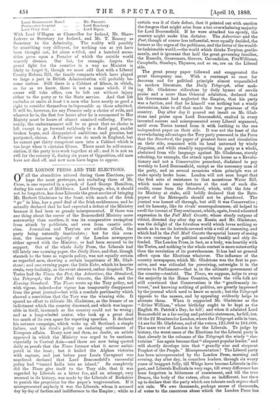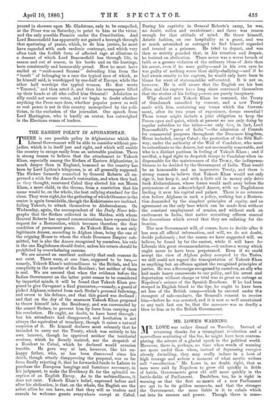THE LONDON PRESS AND THE ELECTIONS.
OF all the absurdities uttered during these Elections, per- haps the most grotesque, not excluding those of Mr. Cross, is one reported in a speech of Lord George Hamilton, during his canvas of Middlesex. Lord George, who, it should not be forgotten, has done Liberals the great service of bringing Mr. Herbert Gladstone to the front, with much of the Irish " go " in him, has a good deal of the Irish recklessness, and he actually declared that he had expected a defeat of the Ministry because it had been so grossly misrepresented. If there was one thing about the career of the Beaconsfield Ministry more noteworthy than another, it was its comparative exemption from attack by publicists, and even from caustic criti- cism. Journalism and Toryism are seldom allied, the party being naturally inarticulate ; but for this occa- -sion, the immense renjority of the London newspapers either agreed with the Ministry, or had been secured to its support. Out of the whole daily Press, the Liberals had till lately one morning paper, the Daily News, and that, though staunch to the bone as regards policy, was not equally certain as regarded men, showing a certain impatience of Mr. Glad- stone; and one evening paper, the little Echo, which its heavier rivals, very foolishly, as the event showed, rather despised. The Tories had the Times, the Post, the Advertiser' the Standard, the Telegraph,. the Pall Mall Gazette, the Globe, and the Evening Standard. The Times wrote up the Tory policy, not with vigour, indeed—for vigour has temporarily disappeared from the great journal—but with a resolute pertinacity which showed a conviction that the Tory was the winning side. It spared no effort to ridicule Mr. Gladstone, as the framer of an indictment which the country disowned, and which was impos- sible in itself, inasmuch as the country could not be wrong ; and as a long-winded orator, who took up a great deal too much of its own space for reporting speeches. It declared his autumn campaign, which woke up all Scotland, a simple failure, and his rival's policy an enduring settlement of European affairs. Every now and then, no doubt, an article appeared in which the Ministry was urged to be cautious, especially in Central Asia—and these are now being quoted daily as proofs that the Times foresaw what it never antici- pated in the least ; but it hailed the Afghan victories with rapture, and just before poor Louis Cavagnari was murdered declared that Lord Beaconsfield's successful policy had "turned India into an island." So completely did the Times give itself to the Tory side, that it was regarded by Liberals as a bitter foe and an attempt, very unusual in its history, was made by the Liberals of Berkshire to punish the proprietor for the paper's tergiversation. If it misrepresented anybody it was the Liberals, whom it accused day by day of faction and indifference to the Empire ; while so certain was it of their defeat, that it pointed out with unction the dangers that might arise from a too overwhelming majority for Lord Beaconsfield. If he were attacked too openly, the country might make him dictator. The Advertiser and the Post, though of course less influential, were equally decided, the former as the organ of the publicans, and the latter of the would- be fashionable world,—the world which thinks Toryism gentle- manly, and is ignorant that half the great governing families, the Russells, Grosvenors, Gowers, Cavendishes, FitzWilliams, Campbells, Stanleys, Thynnes, and so on, are on the Liberal side.
The great penny paper followed and exaggerated the great threepenny one. With a contempt at once for decorum and for political principle almost unparalleled in modern literature, the Daily Telegraph, after mak- ing Mr. Gladstone ridiculous by daily hymns of servile praise and a more than Oriental adulation, declared that his Government had neglected the Empire, that his party was a faction, and that he himself was nothing but a windy rhetorician, false to all that made the true greatness of the country. Day after day it poured out insult on Mr. Glad- stone and praise upon Lord Beaconsfield, exulted in every invented success and misrepresented every Liberal argument, until even Tories turned from it with loathing to the one independent paper on their side. It was not the least of the overwhelming advantages the Tory party possessed in the Press that the Standard, the paper of greatest force and circulation on their side, remained with its head unturned by windy Jingoism, and while steadily supporting its party as a whole, abstained from vile language against Mr. Gladstone, sternly rebuking, for example, the attack upon his house as a Revolu- tionary and not a Conservative precedent, disdained to pay worship to Lord Beaconsfield, except as the necessary man of the party, and on several occasions when principle was at stake openly broke loose. London will not soon forget that the first note of resistance to that monstrous Water Bill, which made so many fortunes at the cost of such dis- credit, came from the Standard, which, with the fate of its Ministry at stake, still boldly declared that the Rate- payers of the Metropolis should not be plundered. The journal was honest all through, but still it was Conservative ; and its honesty, like its rivals' unscrupulousness, all helped to swell the torrent of Tory sentiment, which, again, found educated expression in the Pall Mall Gazette, whose steady outpour of vitriol, directed day after day on Russia and Mr. Gladstone, was the delight of the frivolous world which loves nothing so much as to see its hatreds covered with a veil of reasoning, and which had in the Pall Mall Gazette the special luxury of seeing its own contempt for political morality frankly and ably de- fended. The London Press, in fact, as a body, was heartily with the Tories, and nothing in the whole contest is more noteworthy than the revelation of its powerlessness. It has had no general effect upon the Elections whatever. The influence of the country newspapers, which Mr. Gladstone was the first to per- ceive, and was ridiculed for perceiving, outweighs it in the returns to Parliament—that is, in the ultimate government of the country—tenfold. The Times, we suppose, helps to sway the majority in the Home Counties, where the villa folk are still convinced that Conservatism is the "gentlemanly in- terest," and knowing nothing of politics, are greatly impressed by the journal which used to know so much ; but the Telegraph appeals to the masses, and by appealing evidently helps to alienate them. When it supported Mr. Gladstone as the "divine William," whose birthday ought to be kept as the English St. Patrick's Day, he fell ; and when it adulated Lord Beaconsfield as a far-seeing and patriotic statesman, he fell, too. Of the 22 Members for London, where the Telegraph sells in tons, 14 are for Mr. Gladstone, and of the voters, 125,000 to 104,000. The mass vote of London is for the Liberals. To judge by history, the worst omen of the Elections for the Liberal party is that already in the columns of the Telegraph the windy " rhe- torician " has again become that" eloquent popular leader," and will shortly develope into that "grandly wise and eloquent Prophet of the People." Misrepresentation 1 The Liberal party has been misrepresented by the London Press, morning and evening, day after day, in countless leaders, through six weary years of braggart folly, till Whigs have become Liberals in dis- gust, and Liberals Radicals in very rage, till every difference has been forgotten in bitterness of resentment, and till the true Demos, the body of the voters, often so indifferent, has risen up to declare that the party which can tolerate such organs shall not rule. We owe thousands, perhaps scores of thousands, of votes to the rancorous abuse which the London Press has poured in showers upon Mr. Gladstone, only to be compelled, as the Times was on Saturday, to point to him as the victor, and the only possible Premier under the Constitution. And Lord Beaconsfield has apparently not gained a borough through that spattering of praise, which, to do him justice, he must have regarded with such sardonic contempt, and which very often took the foolish form of affected rage at allusions to a descent of which Lord Beaconsfield has through life, in season and out of season, in his books and on the hustings, been consistently and honourably proud. How he must have smiled at "snub-nosed Saxons" defending him from the " insult " of belonging to a race the typical man of which, as he himself said, is worshipped by one-half of Europe, while the other half worships the typical woman. He first wrote " Tancred," and then acted it, and then his newspapers lifted up their hands at all who called him Oriental ! Adulation so silly could not secure votes, and we begin to doubt whether anything the Press says does, whether popular power as well as real power is not in this country monopolised by the poli- tician, to the exclusion of the journalist. One speech from Lord Hartington, who is hardly an orator, has outweighed in the Elections reams of leaders.



































 Previous page
Previous page